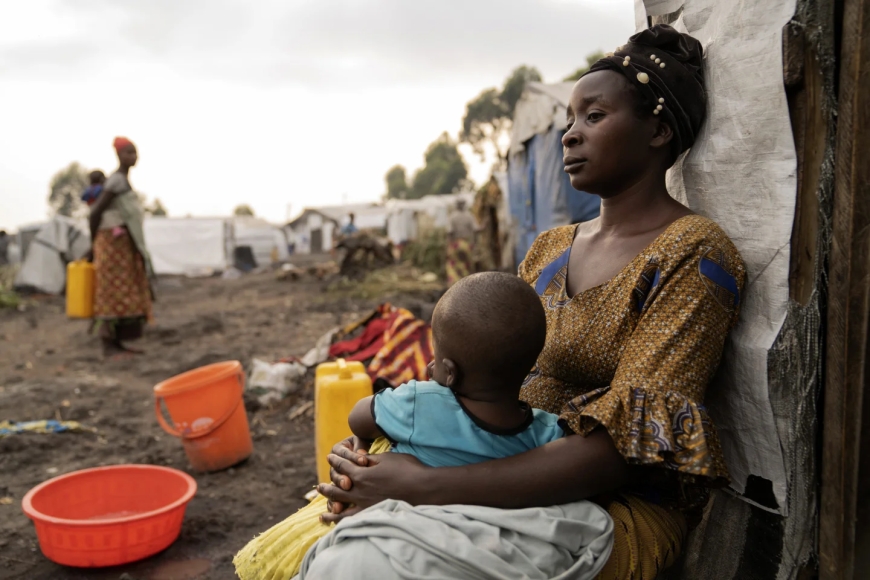Humanitarian Truce in Eastern Congo Nears End, Aid Groups Call for Extended Efforts
A two-week truce in eastern Congo has brought a significant reduction in fighting, but with one week remaining, aid workers and local civil society groups express concern that crucial assistance has not reached the millions trapped in one of the world's largest humanitarian crises.

A two-week truce in eastern Congo has brought a significant reduction in fighting, but with one week remaining, aid workers and local civil society groups express concern that crucial assistance has not reached the millions trapped in one of the world's largest humanitarian crises.
The cease-fire, announced by the U.S. last week, aimed to halt clashes between Congolese forces and rebels allegedly supported by neighboring Rwanda in the mineral-rich region. This year has seen intensified conflict, particularly in North Kivu province, displacing hundreds of thousands.
“Even in accessible areas, the displaced suffer because resources are limited,” said Abdoulaye Barry, head of the U.N. refugee agency's sub-office in the region. Despite the truce, reports of continued violence in Masisi territory near Goma, the capital of North Kivu, underscore the persistent challenges.
In Bulengo displaced persons camp, one of the region's largest, initial joy over the truce quickly turned to disappointment as aid failed to materialize. "We continue to suffer from the lack of humanitarian support,” said Faustin Mahoro, a refugee and head of the camp. “We don’t see the benefit of a humanitarian truce if humanitarian aid does not reach us.”
U.S. Ambassador to the United Nations Linda Thomas-Greenfield acknowledged the challenges in delivering aid to eastern Congo. "This truce was an extraordinary effort, and I think it was an extraordinary step forward to get this cease-fire," she stated. "We will continue to push for the cease-fire to last longer so that we can get humanitarian assistance in."
Eastern Congo, far from the nation's capital Kinshasa, has long been plagued by more than 120 armed groups vying for control over the region's gold and other resources. The March 23 Movement (M23), the most active rebel group, now controls about half of North Kivu province. Richard Moncrieff, the Crisis Group’s Great Lakes region director, noted the group's significant influence.
This year alone, violence has displaced over 7 million people, primarily in the eastern provinces. At least 416 violent attacks targeting civilians have resulted in 1,467 deaths, nearly half of which occurred in North Kivu, according to the Armed Conflict Location & Event Data Project (ACLED).
The cease-fire has provided a semblance of stability for aid organizations. Doctors Without Borders (MSF) stated that the truce allowed them to work "more calmly and deliver medications" in affected communities. "The absence of artillery between the two parties enables us to work more safely in the sites where we offer free care,” said Camille Niel, MSF’s emergency coordinator.
The U.N. children’s agency recently reported a 30% increase in grave violations against children in eastern Congo during the first three months of this year compared to the last quarter of 2023.
Despite reduced front-line fighting, violent clashes continue in villages like Nyange and Bibwa in Masisi territory. M23 rebels and local “youth resistance fighters,” often allied with security forces, engaged in skirmishes as recently as Wednesday, reported Kambere Bonane, a local civil society leader.
“We commend international diplomacy, but we urge the international community to move beyond theory and consider practical solutions for lasting peace,” Bonane emphasized.
As the truce nears its end, the call for extended humanitarian efforts and sustained diplomatic engagement remains urgent, aiming to provide relief and a path towards lasting peace for the beleaguered residents of eastern Congo.
Tags:
- African Union
- crisis
- Sudan
- Africa
- Algeria
- Angola
- Benin
- Botswana
- Burkina Faso
- Burundi
- Cameroon
- Cape Verde
- Central African Republic
- Chad
- Comoros
- Democratic Republic of the Congo
- Djibouti
- Egypt
- Equatorial Guinea
- Eritrea
- Eswatini
- Ethiopia
- Gabon
- Gambia
- Ghana
- Guinea
- Guinea-Bissau
- Ivory Coast
- Kenya
- Lesotho
- Liberia
- Libya
- Madagascar
- Malawi
- Mali
- Mauritania
- Mauritius
- Morocco
- Mozambique
- Namibia
- Niger
- Nigeria
- Republic of the Congo
- Rwanda
- Sao Tome and Principe
- Senegal
- Seychelles
- Sierra Leone
- Somalia
- South Africa
- South Sudan
- Sudan
- Tanzania
- Togo
- Tunisia
- Uganda
- Zambia
- Zimbabwe.













































